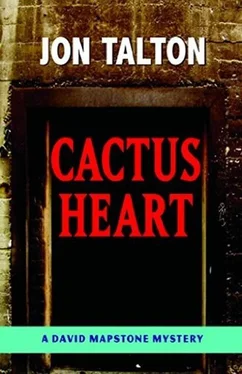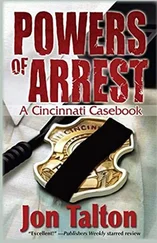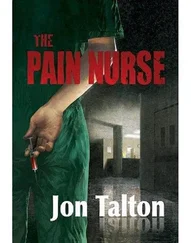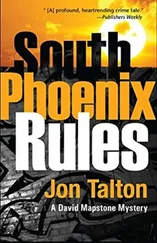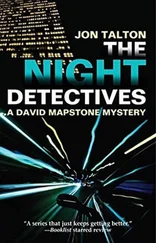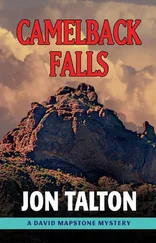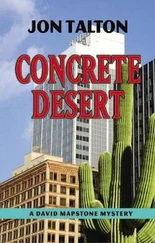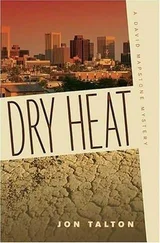After I had married her and we had moved into a little house a block from the beach in La Jolla, I often swam out at night, often alone. The Pacific off San Diego is usually so calm that you can get careless. I always remembered that first night of revelation, when I had swum to catch her, fighting my own fear of being consumed by this world-making thing, and then finding myself a part of it. And I had always tried to remember the terrible power waiting in the gentle waves.
One night, angry over some now-forgotten academic feud, I had driven home from the university, changed into my trunks, and plunged recklessly into water that looked as calm as black glass. I had swum until every muscle burned with pain and I had ejected the argument from my mind. I recall very clearly thinking how much simpler it had been being a deputy. And then I had felt the current change beneath me.
A cold, black wave had hit me full on, then it pulled me straight down into the swell. Salty water had forced its way into my nose. I had felt as if I did a somersault and didn’t know the way to the surface. My lungs had ached for new breath. But the cold had kept my head straight, so I just let the wave carry me out to sea. In a few seconds, that seemed like something less than a year, I had popped to the surface again. Then I had swum as best I could parallel to the lights, feeling a current insistently bearing me south. By the time the ocean let me go, I had been carried a mile away, down to Pacific Beach.
Treading water, exhausted, feeling the ocean say, Don’t mess with me. I will kill you , my mind had calmly rested on things I didn’t think of much on land. Things like God and family and the measure of a man’s life. A sense that I had let too many sunny weekend afternoons slip on by, and now maybe I wouldn’t make it back to shore before I froze to death or that rip current came back. When I walked across the rough sand, safe, I had promised myself I wouldn’t lose that clarity.
I wasn’t making promises Monday. I was shaky and nauseated. My ears rang from gunfire in a confined space. The only lucky break was that the elevator at the courthouse was working again. I went up to my office, closed the door and locked it. I sat at the desk and just stared into the bright Arizona sky and thought of swimming at night in the ocean. Still, I couldn’t stop shaking, couldn’t tone down the metronome in my chest.
I sat long enough that my eyes focused on the edge of an unmarked brown envelope. It had been set up against the door last week. I had brought it in and forgotten it. Now I pulled it out of the new pile of files that partially obscured it, pulled it across the desk. It didn’t even have my name on the outside. I ran a letter opener through it. Two sheets of papers were inside. They were Photostats. The quality was rotten-but good enough to make out. I read them and set them aside, staring up at the old high ceiling. Then I read them again. By that time I wasn’t shaking.
“Talbott. He wasn’t…” I realized I was talking to myself. Grandmother had done that when she was older, and now I wondered if it was hardwired in the family. The first Photostat was the same booking record Zelda Chain had shown me. John Henry Talbott, also known as Jack Talbott, was arrested for misdemeanor drunk and disorderly at 1:10 on the morning of Nov. 27, 1941. The second record was new: it was a Phoenix City Jail prisoner release for Talbott, two days later.
Maybe a burglar had murdered Max Yarnell. Maybe the attack on James Yarnell had been completely unrelated. But Jack Talbott couldn’t have been at Hayden Yarnell’s hacienda on the night of the twins’ disappearance.
I had the phone in my hand with the first two numbers of Peralta’s extension dialed, but I stopped. There wasn’t enough information yet. I knew that Talbott claimed he was framed for the kidnapping, that Win Yarnell had done it. The Photostat before me showed Talbott couldn’t have done it. That Thanksgiving night he was in the city jail one floor above my office. I also knew that Hayden Yarnell had a codicil in his will that implied he had doubts about who had taken his grandsons. But why had Talbott gone to Nogales, and why was he carrying part of the ransom money and children’s pajamas when he was arrested? And what had gone wrong in the kidnapping that had led to the deaths of Andrew and Woodrow Yarnell?
And who had dug up the release record that seemed to clear Talbott of at least direct involvement, then put it in a plain envelope and placed it before my door? Someone who was interested that I make progress on this investigation. It couldn’t have been Zelda Chain; it was delivered the day I was visiting her. Not Peralta: he would have lorded it over me that he had found a record that had eluded my searches of the city and county records. Bobby Hamid? More likely. It seemed like a lot of trouble just to consummate a real-estate deal. But this was Phoenix, after all.
I must have visibly jumped when the door opened, and then Gretchen was running across the room to embrace me, saying how worried she had been after hearing about the shooting. Suddenly it felt so damned good to be alive. It felt so good to be alive to hold and kiss this beautiful woman, who looked at me with adoring eyes. The other feeling that kicked me was guilt, for momentarily thinking about Lindsey and missing her.
That night the rain came, watery inflections on the pavement. Seven inches of rain water this desert in an entire year, so every drop is memorable. Every streak from a seldom-used windshield wiper. Every patter on the bedroom window. Every misty sprinkle on my face on a cool December evening.
When the winter rains come, the sidewalk restaurants move inside. The Fiesta Bowl promoters worry. The resorts cover up the pool furniture, and the snowbirds grumble. But we Phoenicians quietly exult-that after all the punishing months of sun and heat, the sky brings back the healing water. That, after all, the desert is God’s chosen, sacred place.
More secular thoughts were on my mind as I cruised the parking lot at Biltmore Fashion Park for ten minutes before finding a parking place anywhere close to the Coffee Plantation. I had reluctantly turned down Gretchen’s offer of company tonight. Maybe it was the post-shooting jitters, or maybe it was the fact that the Yarnell kidnapping was still unsolved, and these loose ends, forgotten for decades, were still my loose ends. So I worked. The buildings were draped with white holiday lights and steam came out of the car exhausts. The cars glided across the wet parking lot like a dream. By the time I got inside, a familiar blonde in a smart suit with a high hemline was waiting for me. This time the suit was pink. She was sipping from a tiny espresso cup.
“I told you on the phone I shouldn’t even be speaking to you,” said Megan O’Connor, looking around as if bulky Yarneco security guards might spring from under the empty tables nearby. “I thought the crime had been solved. That awful young man, they ran his mug shot on the news tonight. Of course, it’s terrible you had to kill him, but I understand you were doing your job. In any case, I’m meeting my fiancé in just a few minutes. We need to do our Christmas shopping.”
I sat down with her. Taking time to get anything to drink seemed too risky. This skittish bird might fly.
“I didn’t shoot the kid.” Why was I making that point? “There are still a few things we need to clear up. I’m interested in a codicil to Hayden Yarnell’s 1942 will. Are you familiar with it?”
You would have thought I had caressed her fine inner thighs. Her eyes grew wide and she pulled back.
“You know of it?” I asked again.
She gave a slight nod and looked around again.
“Is someone following you?”
Читать дальше
